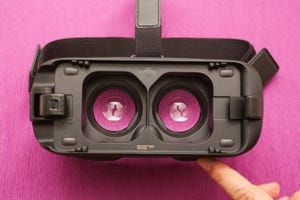
Samsung, Google and Qualcomm Team Up to Build a New Mixed-Reality Platform - CNET
Samsung is the latest tech giant leaning into virtual and augmented reality. The smartphone maker says it’ll work with Google and Qualcomm on an upcoming mixed-reality platform. The news was shared during Samsung’s Unpacked event on Wednesday and follows reports suggesting that Apple could release its first virtual reality headset this year. Qualcomm’s CEO, Cristiano Amon, and Google’s SVP of Android, Hiroshi Lockheimer, appeared onstage to co-announce the collaboration.
Samsung did not mention whether any specific products are in development. It also didn’t provide a timeline for any upcoming mixed-reality products or services.
“It’s more of a declarative announcement about how we are going to get it right in trying to build the XR ecosystem,” TM Roh, president of Samsung’s mobile division, said in an interview with CNET through a translator ahead of the event.
“Google’s been investing for a long time across both experiences and technology in AR and VR,” Lockheimer said onstage. “Delivering this next generation of experiences requires cutting-edge advanced hardware and software. That’s why our collaboration with Samsung and Qualcomm is so exciting.”
Mixed reality is a blanket term used to describe technology that blends the characteristics of augmented and virtual reality. Augmented reality mixes software with the real world by overlaying graphics on top of the user’s surroundings, similar to Google Glass. Virtual reality, by comparison, encompasses the wearer in a 360-degree virtual world, like the Meta Quest 2.
However, a new wave of VR headsets are advancing mixed reality via passthrough cameras, a technique that allows VR and AR technologies to blend into one product line. Meta’s Quest 2 and Quest Pro headsets can do this, as can the upcoming Vive XR Elite. Apple’s expected headset should incorporate the same concept.
The announcement comes at a time of increased interest in virtual, augmented and mixed reality. Apple is expected to release a mixed-reality headset in 2023 that could cost $3,000, according to Bloomberg. Sony’s PlayStation VR 2 and HTC’s Vive XR Elite are both slated to launch this month, and Google teased a new pair of AR glasses at Google I/O last year aimed at language translation. Meta’s Quest 3 is arriving by the end of the year.
Samsung has been relatively quiet about virtual reality aside from its Gear VR headset, which it launched several iterations of between 2015 and 2017. That device is a head-mounted holster for smartphone-powered VR experiences. Roh says there’s been more demand from consumers for augmented and virtual reality, which is why the company chose this time to start discussing its plans. He says that the company has been researching the category for a while.
“And now we believe that we have reached a certain threshold,” he said.
The collaboration makes sense since Samsung, Google and Qualcomm already work together to develop smartphones. Samsung builds the hardware of its Galaxy phones, while Qualcomm supplies the processor and Google manages the software’s underlying Android operating system.
Roh said Google and Qualcomm will play similar roles in the development of this upcoming XR platform, although they will likely overlap in certain areas. Even though Qualcomm would supply the processor, for example, Samsung might make some optimizations, just as it’s done for the chip inside the Galaxy S23 lineup.
“Each player is taking leadership in each category, and then we will be working very closely together across the different categories,” Roh said.
CNET reached out to Qualcomm for comment on the partnership, and received the following prepared statement: “Building upon our existing collaboration with Samsung and Google, we have meaningful plans to collectively drive XR experiences forward. With our Snapdragon XR innovations — together with Samsung’s amazing products and Google’s technology — we have the foundation to make these opportunities a reality and drive the future of the spatial internet.”
Qualcomm has been the chip supplier for nearly every major VR and AR headset for years, and has its own initiative to drive a wave of phone-compatible VR and AR headsets over the next few years. Qualcomm is also collaborating with Microsoft on its future AR glasses hardware, and with Meta on its future devices. It’s unclear whether this new collaboration will be compatible with Qualcomm’s existing Snapdragon Spaces platform for headsets and phones.
Google’s Kaori Miyake, when asked for comment, added, “We’re excited to work with our partners to build a new generation of immersive computing experiences that will further elevate what users can do with Google.”
A collaboration similar to Wear OS?
Two years ago, Samsung and Google announced a collaboration on a next-gen wave of Wear OS watches, which resulted in the Galaxy Watch 4 and preceded Google’s Pixel Watch. While this Qualcomm/Google/Samsung partnership is entirely different, the spirit of the collaboration may be very much the same.
On Wear OS, Samsung served as a hardware partner to help improve core functions of Google’s next-gen watch platform, while Google emphasized software crossovers to Android, as well as adding in Fitbit features. To make a successful next-gen mixed reality hardware platform, it’ll likely require compatibility with existing apps and even phones to ensure the final device doesn’t feel left on an app island like Meta’s hardware often does.
As Apple’s headset looks likely to weave VR and AR compatibility with existing Mac and iOS products, Samsung’s Google/Qualcomm collaboration could do the same for Google and Samsung mobile hardware.
If this is the type of collaboration that this mixed-reality partnership suggests, then Google’s moves in this space remain the next big question mark.
Samsung announced its mixed-reality ambitions alongside its new Galaxy S23 smartphone lineup, which include faster performance, longer battery life on the two smaller models, and improved cameras.


